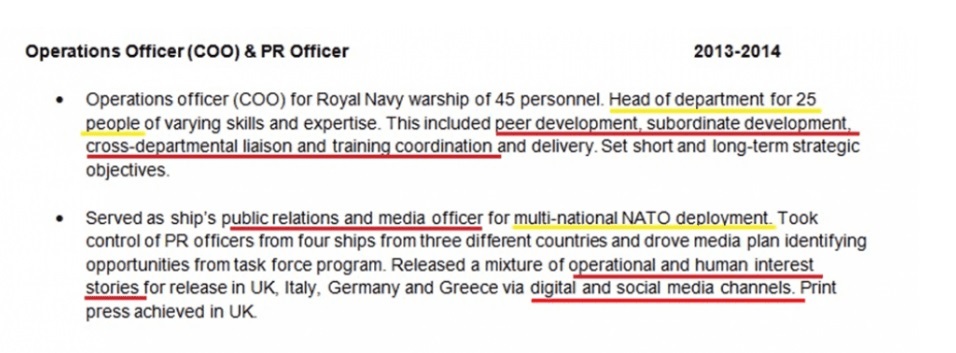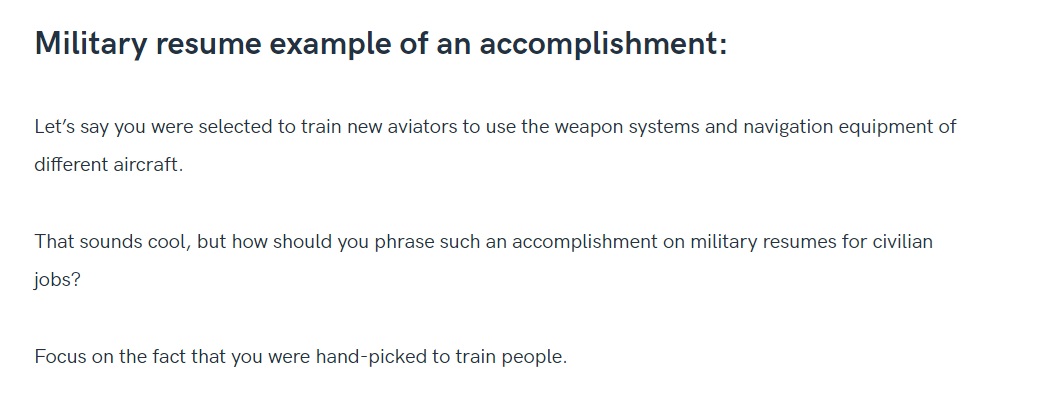Discover how to seamlessly translate your military experience into a civilian resume with our comprehensive guide, including samples and tips. Read more for a successful transition!
Frustrated with sending out your military resume without getting responses from employers? You’re not alone. Join the ranks of the 5.3 million Americans who’ve served as active-duty soldiers since the Gulf War era, many now navigating the challenging transition into civilian life and employment.
Want to stand out and secure those interviews? Learn the art of crafting a military-to-civilian resume that effectively translates your military experience into skills and achievements understandable to civilian employers.
This guide covers:
– A military resume example that outshines 9 out of 10 civilian resumes.
– Strategies for writing a military-to-civilian resume to boost interview opportunities.
– Tips and examples on incorporating skills and achievements into a former military resume.
– Guidance on articulating your experience on a military resume for your dream civilian job.
What is your English level?
Find out your A1 A2 B1 B2 C1 C2 level of English with our online test and receive your English certificate.
The primary issue with your military resume is as follows
Resumes from former military veterans often include terminology and acronyms that may not be familiar to some recruiters. Expressions like “Assistant G-3 Training Officer” and “Battery Commander” may be noteworthy in a military context but may not hold much significance for potential employers.
This sample military resume is for a management position obtained from Washington’s government career portal.
Understanding the connection between the job experience presented and management is challenging without direct communication with the applicant. Without an impressive military resume, the applicant may not get the opportunity to clarify her perspective to the recruiter.
Hence, it is crucial to learn how to craft an effective military resume.

Your Mission, Should You Choose to Accept It
When creating a military-to-civilian resume, your objective is to fulfill the following criteria:
- Illustrate how your military skills, achievements, and experiences are applicable in civilian contexts.
- Captivate recruiters and HR managers to prompt interview invitations.
- Function as a manual for upcoming job interviews.
- Eliminate doubts among recruiters regarding your capability to transition into civilian employment.
- Bridge the gap between your identity in the military and your desired role as a civilian employee.
Planning Your Career Path Outside the Military
Determining the appropriate military skills for inclusion in a civilian job resume becomes challenging when you lack a specific career goal. Before embarking on writing a military resume, it is essential to plan strategically.
Begin by researching occupations closely related to your military duties and identify industries that seek individuals with your skills and training. If you’re uncertain about a specific career path, that’s acceptable. Initiate the process by creating a military resume template as a foundation for different versions.
Compile a comprehensive list of your professional accomplishments, focusing on skills, training, military awards, and education relevant to the targeted job. For instance, if you’re aiming for an accountant position, details about marksmanship awards or the bases you’ve worked at may not be pertinent.
The Reality of Moving to a Different Industry
It can be challenging to acknowledge that the skills you’ve acquired over the years may not directly contribute to securing your next job. However, it’s important to recognize that everyone transitioning to a new industry goes through this adjustment. For example, a graphic designer shifting to become an Air Traffic Controller wouldn’t need to highlight Photoshop skills on their civilian resume.
In adapting to a new career, it becomes essential to selectively omit certain military skills and experiences from your resume. Emphasize those that are transferable to your intended role.
Assume Your Hiring Manager Knows Nothing About the Military
Here’s the deal: You might be employing military jargon on your veteran resume that civilian employers find challenging to grasp, which is quite common after spending years in the military.
Recruiters and interviewers without a military background might struggle to comprehend the terminology used in the armed forces. That’s why it’s crucial to convert military language into civilian terms, ensuring that anyone reviewing your veteran resume recognizes your potential.
Resume writing advice for former military personnel:
1. Steer clear of acronyms; opt for terms like “Base” instead of “AFB.”
2. Refrain from using technical jargon in job titles and skill descriptions; choose terms like “Supervisor” instead of “Non-Commissioned Officer.”
3. Avoid military codes; exclude base or ship codes unless directly relevant to your target job. Utilize your military job title or a civilian equivalent instead of your MOS designator.
Uncertain about the civilian counterpart of your military job? Numerous websites can assist you in making the conversion.
Explore the following resources:
1. CareerOneStop’s Military to Civilian Occupation Translator, sponsored by the U.S. Department of Labor, ensuring reliable information.
2. O*Net OnLine’s Military Crosswalk Search.
3. TAOnline’s MOS Code to Civilian Occupations Translator.
4. Military.com’s Skills Translator.
Simply input the military branch you served in and your MOS code or job title. Subsequently, you’ll receive a list of civilian job titles, and in some cases, actual open positions.
Are you C1 Advanced English?
Get your C1 Advanced English certificate now!
✓ Add your certificate to your resume
⭐ ⭐ ⭐ ⭐ ⭐
Here’s the process for crafting a career summary tailored for civilian audiences
After an exceptional 15-year tenure in military service, specializing in workforce management and deployment, Michael Richards has transitioned into civilian life. Currently, he is aspiring to secure an executive position in HR and Talent Development.
When crafting a resume career summary for his military transition, Michael faces two choices: he can emphasize his military background or concentrate on his civilian career goals. Given that the ex-army resume summary is the initial focal point for hiring managers, Michael’s choice will significantly impact his chances of securing the desired job.

Transition Your Work History and Skills to a Civilian Context
Broaden the scope of your army experience beyond the core functions of your role. Consider other experiences and skills acquired during the job.
Most military positions inherently develop leadership, management, and communication skills. Attention to detail and the ability to perform under pressure are also integral aspects. It’s crucial to highlight these skills.
Below is an example of a navy resume from Timothy Stergiou-Allen, a Veteran Naval Officer from the UK. Notice that it is devoid of military jargon. If terms like “Royal Navy warship” and “NATO deployment” were not mentioned, this military resume example could easily be mistaken for the resume of a civilian PR professional.
In addition to specific achievements (emphasized in yellow), the provided military resume example also outlines Stergiou-Allen’s adaptable skills as a PR officer and COO (emphasized in red).
Incorporating aspects such as peer development and training coordination implies his proficiency in mentoring others and conducting training sessions. The mention of releasing stories through digital and social media channels indicates his familiarity with the tools utilized in digital marketing.

What is your English level?
Find out your A1 A2 B1 B2 C1 C2 level of English with our online test and receive your English certificate.
Here is an additional example of a military resume:
Security Specialist – U.S. Marine Corps 2008 to 2011
- Led and mentored a diverse team of 25 people, attaining a 5% increase in promotions and 20% decrease in turnovers.
- Received recognition for reporting and documentation accuracy.
- Achieved a “zero loss” period in 3 years of managing the security of different equipment worth $125,000
When you come across the term “security specialist,” you may associate it with military or private protection services.
However, this isn’t always the case.
Transferable skills like mentoring, documentation, and security management are highly applicable to financial and management roles. This is because integrity and precise reporting are essential in these fields.
The candidate intentionally omitted details about the specific equipment they protected and the nature of their reports. By maintaining this level of specificity, employers are less likely to pigeonhole your skills as exclusively suited for the military.
Here is an example military resume from Justin Thomas, a former military photographer.

How to Spotlight Accomplishments on a Military Resume
Utilize metrics, percentages, time optimization, and financial figures to quantify your achievements.


Highlight Your Security Clearances and Certifications
Possessing security clearances, even for roles without sensitive or top-secret access, serves as evidence of your accountability and responsibility to potential employers.
Obtaining a Top Secret (TS) clearance involves substantial costs, and companies prefer candidates who have already undergone the necessary background investigation and training required for such clearances.
Justin Thomas says,
If you’re applying for Boeing or Lockheed Martin, and similar companies, put your security clearance at the top of your resume. It helps recruiters decide whether they want to take a chance on you.
llustrations of Security Clearances and Certifications in a military resume:
- Secret Security Clearance
- Weapons Certification
- First Aid Certification
- Top Secret / Sensitive Compartmented Information Clearance
Remember to craft a cover letter tailored for your military-to-civilian transition
Certainly, a cover letter is essential. Hiring managers frequently review resumes to determine their relevance. Subsequently, they turn to the cover letter to gain a more comprehensive understanding of you. Avoid duplicating the content of your military resume.
Rather, utilize your cover letter to supplement the information you’ve already presented. It serves as an opportunity to provide explanations and elaborate on details that were kept concise in your veteran resume.


